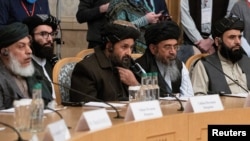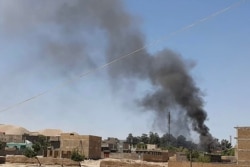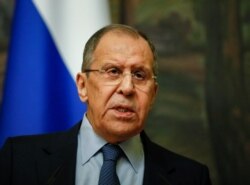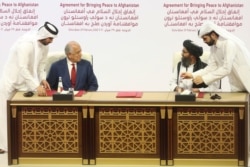As the American military withdrawal from Afghanistan nears completion, regional countries are stepping up diplomatic efforts aimed at pressing warring Afghans to resume the stalled U.S.-brokered peace talks and prevent the conflict from escalating into a full-blown civil war.
The fears of further bloodshed stem from the Taliban’s rapid territorial gains since U.S. and NATO allied troops formally began leaving the country in early May under orders by President Joe Biden. The withdrawal is due to be completed by August 31.
Fighting has escalated between the insurgent group and Afghan security forces in provinces next to the country’s long border with Pakistan.
Last week, Tajikistan ordered 20,000 reservists to bolster border security following the Taliban battlefield advances. Iranian and Turkmen authorities also have taken additional border security measures, fearing the violence could spill over into their territories.
The Islamist group has downplayed the prospect of a civil war erupting in Afghanistan after the exit of all foreign troops and sought to reassure anxious neighbors that they pose no threat to regional stability.
Intra-Afghan peace talks have been mostly stalled. Beijing, Tehran, Moscow and Islamabad have all tried to engage the Taliban in an effort to press the Afghan warring sides to negotiate a political settlement before the U.S. drawdown creates a security vacuum and the situation spirals out of control.
Foreign ministers of the China-led Shanghai Cooperation Organization, or SCO, are scheduled to meet this week in Tajikistan to discuss the Afghan crisis. The SCO brings together Russia, Pakistan, Kazakhstan, Kyrgyzstan, India, Uzbekistan, Tajikistan and Turkmenistan.
Analysts say all of Afghanistan’s immediate neighbors and regional countries look at the Taliban as legitimate political stakeholders and a possible firewall against militants linked to Islamic State terrorists who operate out of Afghan bases.
“The region is more amenable to engaging with the Taliban now than it was in the 1990s, because it sees the group as a more legitimate actor,” said Michael Kugelman, deputy Asia program director at Washington’s Wilson Center.
“The Taliban agreement with the U.S. last year conferred the group with a degree of international recognition that it had long sought, and that makes regional players see it as less of a pariah,” noted Kugelman in his written remarks he sent to VOA.
Influential Pakistani Senator Mushahid Hussain, who heads the Defense Affairs committee of the upper house of parliament, says China, Iran and Russia apparently “are reconciled to a Taliban-dominated Afghanistan.”
“China, Iran and Russia have a certain comfort level with the Taliban and they are willing to cooperate with them and give them legitimacy, unlike 1990s, when only Pakistan, UAE and Saudi Arabia recognized them,” Hussain told VOA.
Hussain noted, however, prevailing concerns in his country that the Islamist movement’s battlefield advances in Afghanistan would embolden extremist forces in Pakistan and could threaten years of domestic gains against terrorism.
“Ironically, for Pakistan there is growing realization, a lesson learned the hard way, that the foes they’ve been fighting in our own inland war on terror may end up being friends of the incoming Taliban regime in Afghanistan,” cautioned Hussain.
Both Iran and Russia hosted Taliban leaders over the past week to discuss concerns arising out the militia’s military advances. Observers say this points to a growing political synergy between the Taliban and their regional supporters.
Washington has warned the Taliban against any military takeover and continued to call for finding a negotiated settlement to the long Afghan conflict, emphasizing that “legitimacy and assistance” for any government in Afghanistan “can only be possible if that government has a basic respect for human rights”.
A total Taliban takeover of Afghanistan has raised the prospects of a prolonged civil war like that of the 1990s, which erupted shortly after the withdrawal of Soviet occupation forces.
The ensuing intra-Afghan fighting paved the way for the Islamist Taliban to seize power in Kabul in September 1996 before they were ousted by the U.S.-led international military invasion in late 2001 for harboring leaders of the al-Qaida terrorist network.
Pakistan, the United Arab Emirates and Saudi Arabia were the only three countries in the world that had recognized the Taliban regime at the time.
The rest of the global community refused to recognize Taliban-ruled Afghanistan, citing controversial harsh Islamic laws the group introduced to govern the country and allowing safe haven for leaders of the al-Qaida terror network whom the U.S. accused of plotting the September 11, 2001 attacks on America.
On Sunday, a Taliban delegation held talks with Foreign Ministry officials in the Turkmen capital, Ashgabat. A spokesman for the group, Suhail Shaheen, said two sides discussed “political, economic and security issues of mutual interests.”
On Friday, a group of senior Taliban members concluded a two-day visit to Russia, where they met Zamir Kabulov, the Russian presidential envoy for Afghanistan.
“The situation in Afghanistan today is worrisome because it can spillover into our neighbors’ territory,” Russian Foreign Minister Sergey Lavrov told reporters on Friday after his meeting with the visiting Indian counterpart.
Lavrov downplayed the Taliban’s advances, however, and reiterated Moscow’s call for the two warring sides to find a political solution to the Afghan conflict.
Last week, Shiite Iran also hosted a meeting between the rival Afghan parties, calling on both to end hostilities.
Tehran’s tensions had dangerously escalated with Kabul in 1998 when the Sunni-based Taliban were ruling the country. The tensions stemmed from the killings of seven Iranian diplomats in the northern Afghan city of Mazar-i-Sharif in factional fighting.
The Afghan government protested Monday over the Taliban leaders’ foreign trips. The foreign ministry said in a statement that Kabul appreciates support of its regional and international partners to the peace process but it expects that these efforts are made in direct consultation with the Afghan government.
"The Taliban delegation is traveling to the regional countries at a time when its brutal attacks have killed more than 3,500 people, displaced more than 200,000 of our compatriots, disrupted public order and life, and economic activities in tens of districts,” the statement lamented.
Beijing, which maintains diplomatic ties with Kabul and developed close contacts with the Taliban in recent years, has cautioned “the future of the Afghan conflict is a practical challenge” to China and Pakistan.
“We call on parties to the peace negotiation to put the interests of the country and people first, sustain the momentum for intra-Afghan talks, work for the return of the Afghan Taliban in a moderate way to the political mainstream,” Chinese Foreign Ministry spokesman Wang Wenbin told reporters on Thursday.
Critics, however, anticipate Afghan hostilities will intensify once all U.S. and NATO allied troops are out of the country.
Zalmay Khalilzad, the U.S. special envoy for Afghan reconciliation returned to the region this week to “engage in determined diplomacy and the pursuit of a peace agreement between the Islamic Republic [Afghan government] and the Taliban,” according to the State Department.
Khalilzad, who negotiated the troop withdrawal deal with the Taliban in February 2020 under then-President Donald Trump, is scheduled to travel to Pakistan, Uzbekistan after concluding meetings in Qatar, where he signed the deal with the Taliban.
The Qatari capital of Doha, which houses the Taliban’s political office, has also been hosting slow-moving peace talks between insurgent leaders and Afghan government negotiators since last September, but the so-called intra-Afghan negotiations have seen little success.
Analysts say there is still a “narrow, but fast-closing window to collectively push forward the peace process.
“Let it not be said that diplomacy failed the people of Afghanistan who have already suffered so much through decades of war, turmoil and strife. And let history not judge that Afghanistan and the region all lost the peace,” Maleeha Lodhi, former Pakistani ambassador to the U.S. and the United Nations, wrote an opinion article published by the Dawn newspaper Monday.









